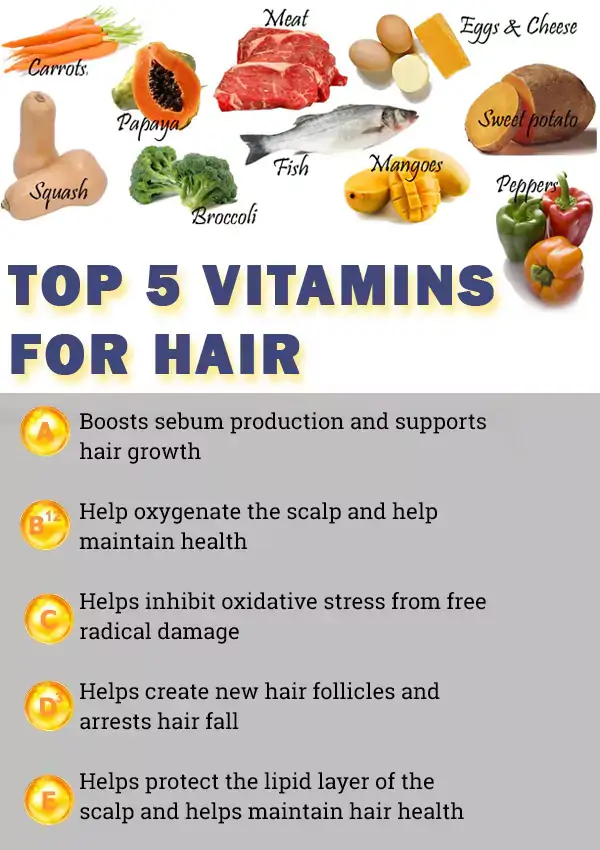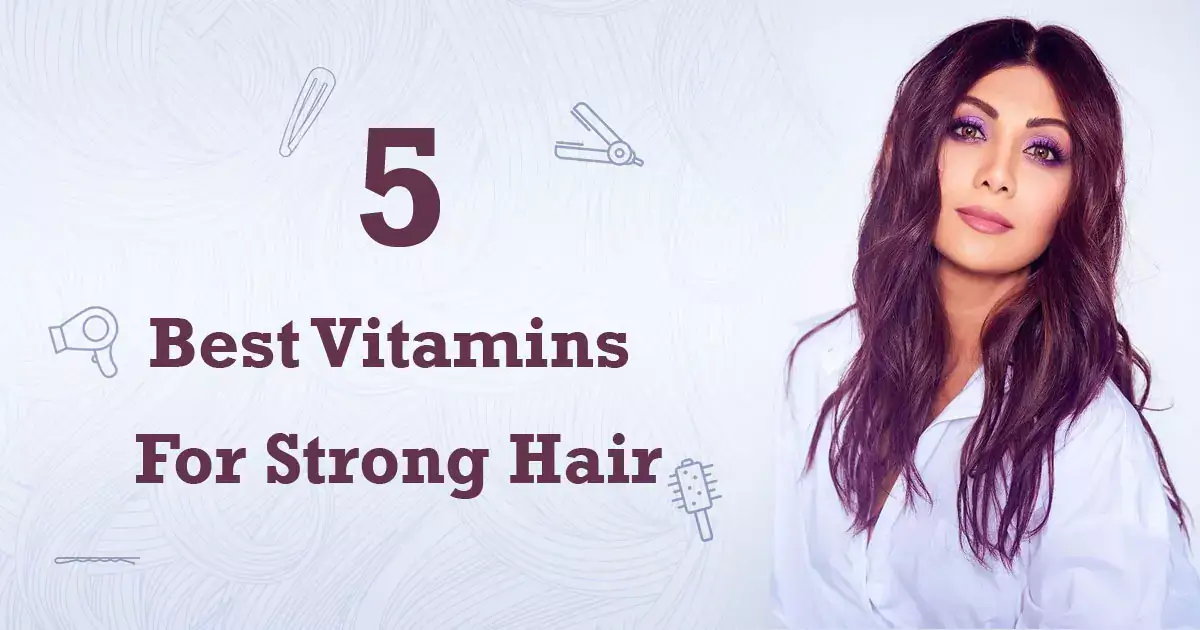People shed at least 50 to 100 hair strands per day and it’s part of the healthy renewal cycle of the body. But when hair shedding becomes too much, and while brushing your tresses, seeing more and more strands fall off from your scalp is increasing your worries, it’s time to consider looking into hair care supplements to help manage hair loss. So, what are those essential hair care vitamins?
There’s no denying the fact that genetics and hormones play a big role in hair health and we can’t do much about it. But we can definitely reverse conditions like hair fall with a healthy lifestyle and nutrient-rich diet. Consumption of vitamins plays a major role in maintaining or improving scalp skin health. Let’s find out which vitamins can help keep up the flow of nutrients to the hair follicles.
ALSO READ- DIY Hair Spa At Home In 5 Easy And Simple Steps
Essential Hair Care Vitamins- Vitamin A
Whether it is for skin, nails, vision, immunity or hair, Vitamin A plays an important role in our body. For hair, in particular, there are two functions where vitamin A is essential: cell growth and sebum production.
Cells make up the different tissues in our body. Our hair is the fastest-growing tissue, and how well cells grow and build your hair can depend on vitamin A as one of the essential components. Sebum, a naturally-occurring oil produced by the body is responsible for keeping healthy hair sufficiently hydrated. Vitamin A keeps the scalp moist and makes it less prone to dryness and flaking.
However, a statement by the World Health Organisation (WHO) reads that an overdose of vitamin A may lead to hair health issues like ‘alopecia’. That means too much vitamin A can also have negative effects, as vitamin A speeds up hair growth and could eventually cause it to fall out more quickly. So, keep in mind- Too little vitamin A isn’t good for your hair, but neither is too much of it.
Recommended Dietary Allowance (RDA)
The recommended dietary allowance of vitamin A is 0.9 mg per day for men and 0.7 mg per day for women
Vitamin A Rich Foods
Milk and other dairy products like lassi, chaach and paneer are excellent sources of vitamin A. Other animal products like eggs and orange/yellow coloured vegetables are also high in beta-carotene (which makes vitamin A) such as carrots, pumpkins and sweet potatoes.
ALSO READ- Dimple Kapadia Hair Care Secrets Revealed
Biotin (Vitamin B7)
Biotin (Vitamin B7), one of the essential hair care vitamins, is part of the B complex group of vitamins. It is known to improve the structure of keratin, a basic protein that makes up hair, skin, and nails so that it can improve hair growth, including volume and coverage on the scalp. By stimulating keratin production in hair, it can increase the rate of follicle growth. With a regular intake of vitamin B7, you can support the health of your hair, strengthen the hair and add shine to it. Biotin also helps prevent various health problems like hair loss, dandruff, scalp itchiness, etc.
Recommended Dietary Allowance (RDA)
The recommended dietary allowance of biotin intake among adults and teenagers is 30 to 100 mcg per day and for children, it is 25 mcg per day
Biotin Rich Foods
Some of the extremely rich sources are bananas, mushrooms, sweet potatoes, nuts, seeds, legumes, fish, meat etc.
ALSO READ- Pre Bridal Hair Care Tips At Home For Every Bride-To-Be
Vitamin C
As a powerful antioxidant and natural collagen booster, vitamin C helps flush out toxins and promote the flow of oxygen and blood in the cells, further aiding thicker hair production. Although vitamin C is beneficial for all hair types, it may be especially helpful for those with dull hair and hair that is susceptible to breakage. Those with colour-treated or damaged hair may garner extra benefits from the collagen-boosting powers of vitamin C.
It also contributes to a healthy scalp environment, which can influence the appearance of the hair overall. This vitamin works to brighten and improve the overall shine of the hair. In addition, Vitamin C is essential for iron absorption and prevention of anaemia which further aids the blood flow in our scalp.
Recommended Dietary Allowance (RDA)
The recommended dietary allowance of vitamin C intake among women is 75 mg per day, while men should take 19 mg of vitamin C per day.
Vitamin C Rich Foods
Citrus fruits like lemons, oranges, berries and grapefruits are a rich source of vitamin C. Find out some more vitamin C-rich food sources.
ALSO READ- DIY Yoghurt Hair Masks For Most Common Hair Problems
Vitamin D
Lack of vitamin D may not be the reason for all types of hair loss, but it may play an important role in the development of alopecia and pattern baldness. Studies have shown that vitamin D deficiency does cause hair loss and other hair problems. When there isn’t enough vitamin D in your system, new hair growth can be stunted. It leads to a poor hair growth cycle which can result in slow regrowth that could aggravate hair thinning and the appearance of bald spots.
Vitamin D supplements should be taken with meals, particularly ones with plenty of healthful fats. Fat helps the vitamin D to be absorbed into the body. Therefore, it is important to load up on vitamin D to make up for the deficiency and treat hair-related problems.
Recommended Dietary Allowance (RDA)
The recommended dietary allowance of vitamin D among men and women is 0.025 mg per day.
Vitamin D Rich Foods
Sunlight is the main source of vitamin D. Besides, there is a range of foods that can help you get your daily dose of vitamin D. Click here to learn about the best food sources of vitamin D.
ALSO READ- Foods For Strong Healthy Hair To Make Hair Grow Faster And Thicker
Vitamin E
Vitamin E is essential for healthy skin — and this includes your scalp. It supports the scalp and gives your hair a strong base to grow. Vitamin E’s antioxidant powers help fight free radicals so your scalp can support healthy hair follicles. A diet rich in this vitamin will help protect your hair from the environmental stresses of modern life so your hair stays healthier, for longer! Vitamin E aids in bringing back natural shine to your hair as it protects and preserves the outer layers of your hair from various external threats.
Recommended Dietary Allowance (RDA)
The recommended dietary allowance of vitamin E among men and women is 10 mg per day.
Vitamin E Rich Foods
Nuts like almonds, leafy greens, olive oil, and sunflower oil are some of the richest sources of vitamin E. It’s also found in meats, seeds and fortified foods like breakfast cereal.
ALSO READ- DIY Beer Beauty Benefits: Make Your Hair Shine And Skin Glow

